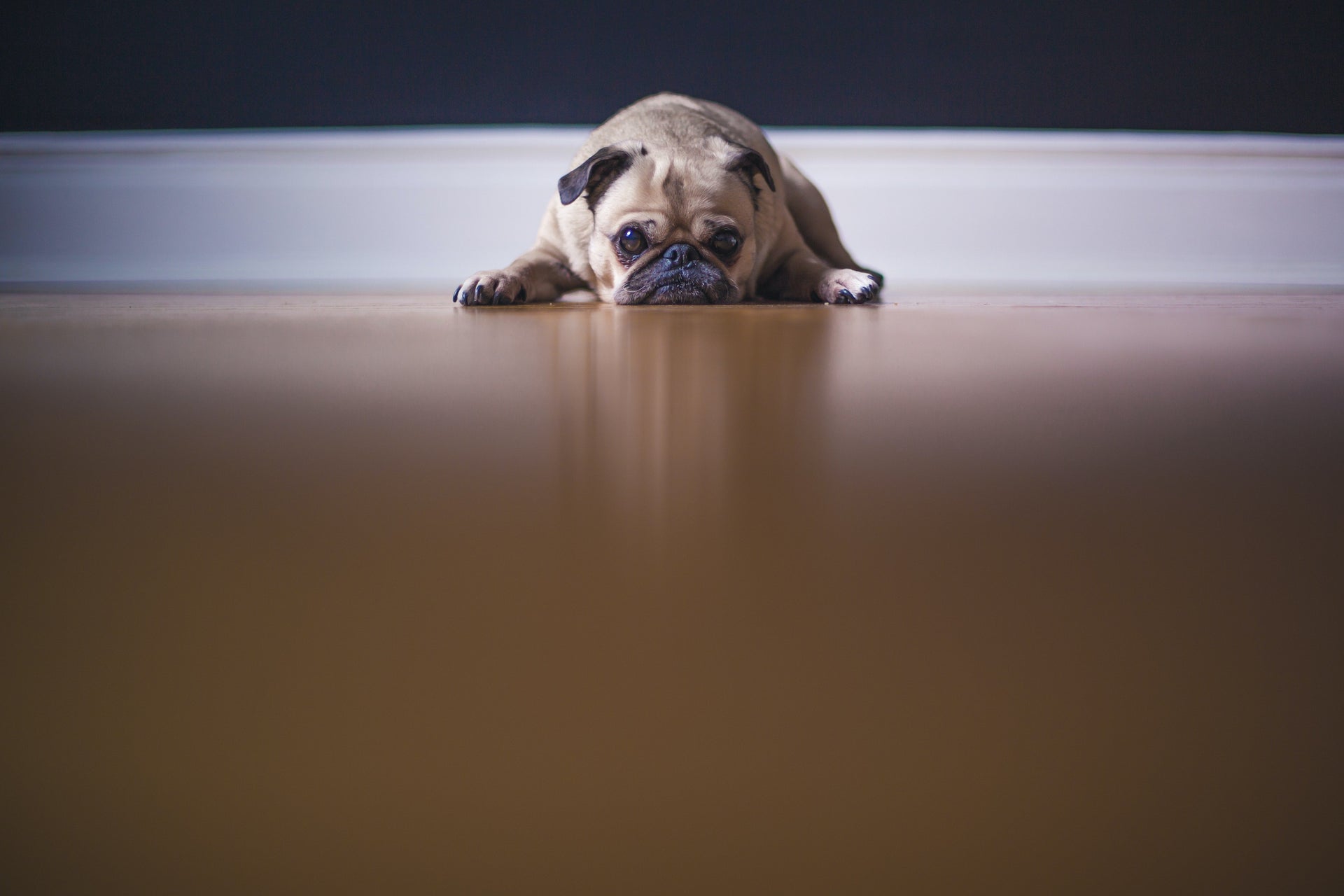Does Your Dog Suffer from “Separation Anxiety?”
March 24, 2022

Published: March 2022 | Updated: September 2023
According to newly published dog health studies, separation anxiety is one of the most common problems dog parents face, especially if you live in an urban area, or small dwelling. And it can lead to more severe problems such as decreased immune response, poor digestion, self inflicted wounds and aggressive behavior.
It is easy to become frustrated when your dog has separation anxiety, and that frustration can be sensed by your dog, making the situation that much more difficult.
What is separation anxiety, exactly?
Separation anxiety is often thought to be simply a dog who becomes upset when their guardian leaves the house.
This is not always the case, though. A dog can experience separation anxiety, in severe cases, by their guardian just leaving the room.
Symptoms of Separation Anxiety in Dogs
Separation anxiety has a variety of symptoms but most commonly involves:
- Excessive salivation
- Excessive vocalization (whining, barking, howling)
- Chewing items in the house
- Urinating/defecating in the house
- Scratching the walls and floor in an attempt to escape
- Depression-like behavior
Separation anxiety can be destructive and overwhelming, but we’re going to break down some of your options right now. Don’t worry; You and your dog are not subjected to this condition and are already on the path to healing!
1) Build Trust
This option involves leaving your dog alone for short periods of time. This is a time-consuming option so be sure to set some time aside for the next couple of weeks if possible. If your dog has severe separation anxiety, start by just leaving the room for short periods of time, then go back to the room where your dog is.
Once he is comfortable with this, you can then move to leave to another side of the house completely or even step outside for a moment, then come back in. You can then increase the amount of time you spend away from the home little by little. This will allow your dog to understand you will always come back and instill a sense of trust in you.
2) Crate Training Can Be Helpful
Crate training can help significantly in reducing feelings of separation anxiety. If your dog is not familiar with their crate, they should not be placed in the crate for an extended period of time immediately. Instead, they should be placed in the crate for short periods of time to become comfortable. Be sure to place their favorite blanket and bone with them during their time in the crate.
Many times, dogs soon learn this is their 'safe' place. Be sure to leave the door open in case your dog wants to escape to his crate if there's company, or even if he's just tired.
The crate should be large enough so he is able to stand all the way up, and he should be able to turn around and get comfortable easily.
3) Use the Power of Music
Classical music, as well as the music that dogs appreciate (and would listen to) in their daily lives, has been shown to benefit dogs with anxiety.
Soft and relaxed melodies are not only soothing to your dog, but they also keep them quiet for a while, which can help with separation anxiety.
Increasingly more veterinarians are advising pet owners to play music for their pets when they are gone or driving.
Dogs respond favorably to many genres of music, according to research, and a particular melody may have calming benefits on them.
4) Restore Balance in the Gut
Did you know a dog’s behavior can be connected to their gut health? The bacteria that live in your dog's stomach (digestive system) may alter their emotions, and thus their behavior, as bizarre as it may sound.
Evidence suggests that the gut has an impact on the brain and that the two are continuously communicating back and forth to one another. So, even if you do take the steps above, if their gut is not healthy, the issue may continue.
Research has found gut bacteria send chemical messages to the brain and that's where the effect on mood comes in. The effects of the chemical messages depend on which bacteria are residing in the gut as each one produces a different chemical type. Certain bacteria produce chemical reactions that have a calming effect, whereas others promote anxious tendencies.
A Research Study Dedicated to Gut Health and Canine Emotion
A study published in Gut Microbes journal indicated a correlation between negative tendencies and gut health in dogs. In the study, gut bacteria were sampled from 31 dogs that were found in a dog-fighting environment. Researchers in this study chose aggression as their baseline.
Keep in mind, feelings of anxiety and aggression are similar and anxiety can lead to aggression. The 31 dogs were split into two categories; dogs who displayed aggression and dogs who did not.
After taking samples and analyzing each dog's gut microbiome, researchers discovered there were particular strains of bacteria present in those who appeared aggressive. Although the sample size in this study was relatively small, it's paving the way toward understanding the correlation between aggression, anxiety, and gut health in our dogs.
While there is still more to uncover, it is obvious that our dogs' gut microbiome is involved in a variety of physical and psychological processes. As a result, a healthy dog, inside and out, begins with a healthy gut. This is where probiotics come in. And, keep in mind, not all probiotics are created equal.
Choosing a Probiotic for Your Dog
Once you make the decision to improve your dog’s gut health, it’s time to begin looking for a probiotic that will help balance their digestive tract. It's vital to select the best probiotics to help with not only gut health but also emotional balance.
Beneficial bacteria may seem counterintuitive, given that we've been taught since childhood that all bacteria are evil. Beneficial bacteria, on the other hand, play an important part in your dog's and your own immune systems. Saccharomyces boulardii, in particular, is one of the most helpful bacteria.
Antibiotics are unable to kill S. boulardii, which is one of the many reasons why nutritionists tend to recommend this strain in particular. It can also be taken alongside antibiotics to protect healthy gut bacteria and prevent antibiotic-related side effects. You can find a highly concentrated form of S. boulardii in Daily Dog.
Get Your Dog Started on the Path to Wellness
When it comes to dog behavior issues, it's important to focus on the cause rather than the effect. If your dog has behavioral concerns, you should pay attention to their digestive health. Of course, you should follow the other suggestions as well, but if your dog's gut health isn't addressed, you may find yourself locked in the same cycle.
Subscribe to Daily Dog today and watch your dog’s gut and behavior soar!
Read More:
Probiotics Drive Gut Microbiome Triggering Emotional Brain Signatures

